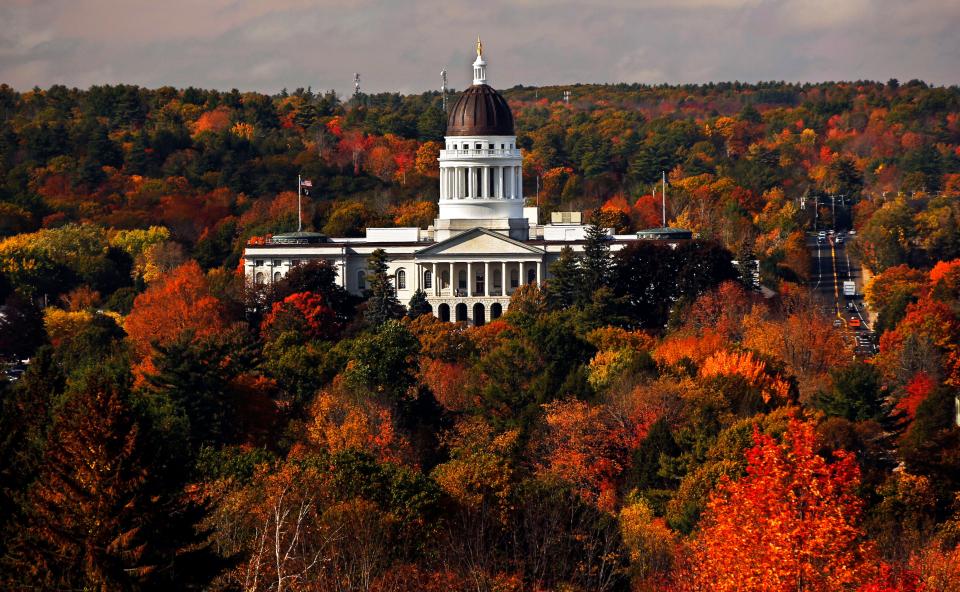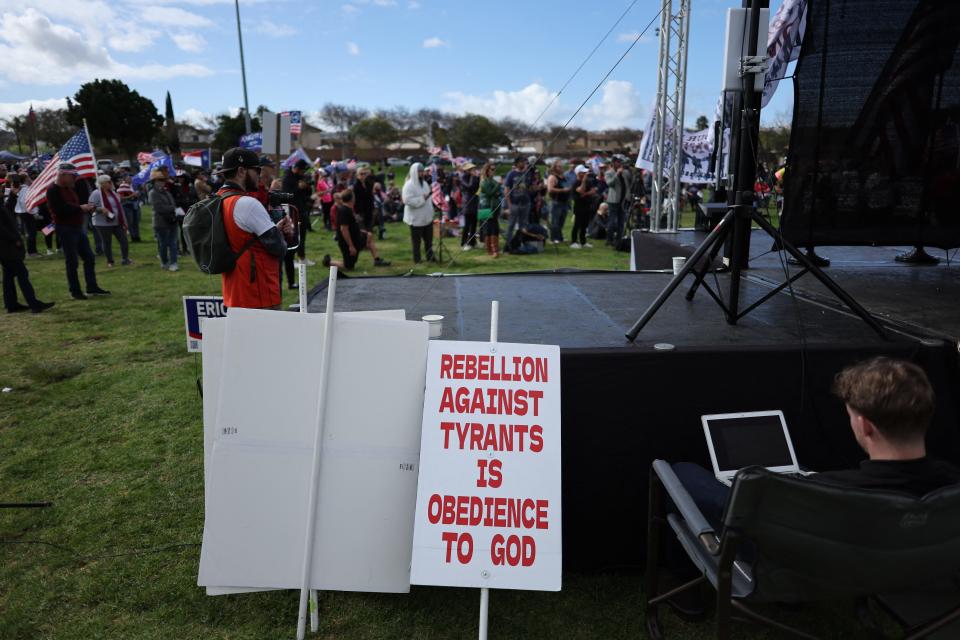Bomb threats in Maine legislature follow bills on transgender care
A bomb threat again disrupts Maine, where lawmakers have considered bills protecting care for transgender youth. Extremist rhetoric is front and center in the governor's race in North Carolina. As Trump secures the GOP presidential nomination, he is increasingly embracing Christian nationalism, which has experts on extremism and religion concerned.
It’s the week in extremism.
Bomb threats in Maine after pro-LGBTQ+ legislation

A series of bomb threats made against the Maine state capitol and at least two state lawmakers early Friday morning became at least the second round of threats to disrupt the legislature this year, as it has taken up bills related to health care for transgender children.
The Maine State House was evacuated Friday morning because of the threats, Derek Grant, secretary of the Maine Senate, confirmed to USA TODAY. Annina Breen, communications director for the Maine Democratic Party, told USA TODAY the party’s offices were also evacuated and searched for an explosive device this morning. Nothing was found, Breen said.
Those bills, and the legislators targeted by the threats, have also been publicized by the right-wing social media account Libs of TikTok. That influencer – as USA TODAY first reported – has tweeted about schools, hospitals and other public institutions that quickly became targets of bomb and death threats dozens of times in recent months.
USA TODAY was provided copies of the emailed threats, which were also sent to Alejandra Caraballo, a clinical instructor at the Harvard Law School Cyberlaw Clinic who writes frequently about the issues.
One emailed threat was apparently sent to Anne Perry, a state representative. Perry, a Democrat who represents a small district in far-northeastern Maine, is the main sponsor of LD227, a bill introduced this week that would protect doctors in the state who provide gender affirming care to patients from states that have laws hostile to such treatment.
The threat also apparently named Sen. Donna Bailey, Perry’s co-sponsor on the bill.
Earlier this week, Perry and Bailey were targeted in a series of posts on X, formerly known as Twitter, by Libs of TikTok. The tweets listed both lawmakers’ email addresses.
In January, the Maine State House was evacuated for a bomb threat on the first day of the legislative session. At the time, the legislature was considering another bill on transgender care. That bill died in committee later the same month.
Calls and emails to Perry, the Maine State Police, Maine Capitol Police and FBI were not immediately returned.
According to the Human Rights Campaign, an advocacy group that tracks anti-LGBTQ+ legislation, one in three transgender youths lives in a state that has passed a ban on gender-affirming care.
Investigation: When Libs of TikTok tweets, threats increasingly follow
Christian nationalism, Trump and worries about extremism

The recent rise in Christian nationalism, and the movement’s embrace by presumptive GOP presidential nominee Donald Trump, are examined in a USA TODAY story this week. While Christian nationalism has historical roots, experts say a once-fringe belief system is having a moment in 2024.
Last month, a trio of convoys calling themselves “God’s Army” converged on the U.S.-Mexico border to protest what they called a flood of immigrants into the country.
Christian nationalists believe broadly in Christianity, but many believe in erasing the boundaries between church and state. That can range from thinking religion should play a larger role in government to believing a president is a literal messiah sent by God.
The former president has increasingly embraced Christian nationalist imagery and language, experts said. Trump rallies now feel more like megachurch services than political events, they said, and the presumptive GOP nominee recently shared a video on social media stating that he was “chosen by God.”
The new movement feels like the start of a new religion, said Brian Kaylor, a Baptist minister and author who writes about Christian nationalism. “It’s the MAGA church,” Kaylor said.
If Trump loses in November, experts in domestic extremism worry about Jan. 6-style violence and unrest from followers of the movement.
Special report: As Trump support merges with Christian nationalism, experts warn of extremist risks
Nominee for governor uses extremist rhetoric

North Carolina’s Lieutenant Governor Mark Robinson became the GOP’s nominee for governor on Tuesday. He has made headlines not just for his quick rise in politics – he was a factory worker until 2018 – but for his criticisms of LGBTQ+ people, Jewish people and a range of other elements of American society. Some of those remarks echo extremist rhetoric that has been used to attack the same groups.
Robinson’s attacks on the LGBTQ+ community have been especially virulent. He has called the community “filth,” said that straight people are “superior” and called gay people equivalent to "what the cows leave behind" as well as "maggots" and "flies."
Robinson has called the COVID pandemic a global conspiracy and frequently used antisemitic language including Holocaust denial.
In 2014, Robinson quoted Hitler on Facebook. In 2017, he posted a hateful and homophobic comment about Michele Obama on the platform.
Robinson easily won his party’s nomination for governor. He will face Democratic Attorney General Josh Stein in November, in a state that has already drawn national attention for a raft of new restrictions it has placed on voting since 2020.
Statistic of the week: 15,387,162
That’s how many total views there were for more than 135 posts on social media platforms denying that Hamas committed sexual violence during its Oct. 7, 2023, attack on Israel, according to CyberWell, a nonprofit focused on monitoring for and combatting antisemitism online.
This week, a United Nations team found "reasonable grounds to believe" sexual violence, including gang rape, took place during the Hamas attack.
This article originally appeared on USA TODAY: Maine bomb threats; anti-LGBTQ+ rhetoric in N.C.
